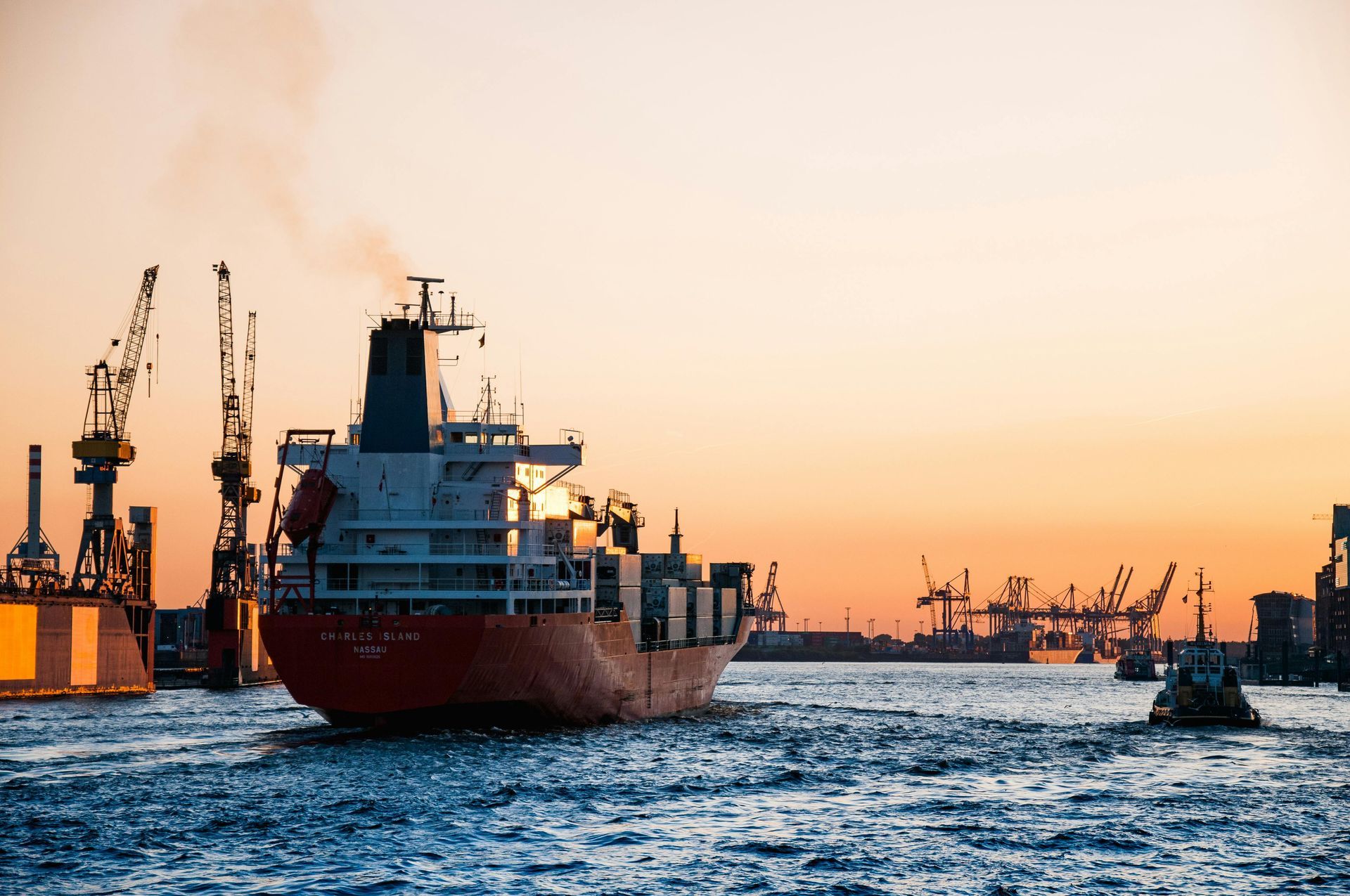The Pivot Freight BLog: Your Gateway to Freight Insights

I remember the first time a client came to us at Pivot Freight, looking slightly overwhelmed and clutching a folder full of documents they weren't quite sure what to do with. They were shipping their first container to Australia and had no idea where to start. The confusion on their face was something I'd seen dozens of times before—sea freight can feel incredibly complicated when you're new to it. But here's what I've learned after years in this industry: once you understand the process, it's far less intimidating than it seems. Yes, there are regulations and paperwork and logistics to consider, but that's exactly why freight forwarders like us exist—to guide you through it all. If you're planning your first sea freight shipment to Australia, let me walk you through what to expect. I'll break down the process, highlight the potential pitfalls, and hopefully make the whole thing feel a lot more manageable. Why Choose Sea Freight to Australia? Before we dive into the how, let's quickly talk about the why. Australia is an island nation, which means the vast majority of goods arrive by sea. While air freight exists for urgent shipments, it's expensive—sometimes prohibitively so. Sea freight offers a cost-effective solution for larger shipments, heavy goods, or items that aren't time-sensitive. I've worked with businesses shipping everything from machinery and building materials to furniture, retail stock, and personal effects. If you're moving significant volume or weight, sea freight is almost always the smarter financial choice. Yes, it takes longer—typically 2-6 weeks depending on your origin port—but the cost savings can be substantial. Understanding Your Shipping Options One of the first decisions you'll need to make is whether you're shipping a Full Container Load (FCL) or Less than Container Load (LCL). FCL means you're filling an entire container—usually a 20-foot or 40-foot container. Your goods are the only ones in that container, which means more security, less handling, and often faster transit times. If you have enough cargo to fill or nearly fill a container, FCL is usually the way to go. LCL means your goods share a container space with other shippers' cargo. This is ideal for smaller shipments that don't warrant a full container. The trade-off is that it typically takes a bit longer because the container needs to be consolidated at the origin port and deconsolidated in Australia, but it's much more economical for smaller volumes. At Pivot Freight, we help you assess which option makes the most sense based on your cargo volume, budget, and timeline. Sometimes the answer isn't immediately obvious, and that's where our experience comes in handy. Getting Your Documentation Right I won't sugarcoat it—documentation is probably the most tedious part of sea freight, but it's absolutely critical. One missing document or incorrect detail can delay your shipment for days or even weeks. Here's what you'll typically need: Commercial Invoice : This details what you're shipping, the value, and the terms of sale. It needs to be accurate because Australian Customs will use it to calculate duties and taxes. Packing List : A detailed breakdown of what's in your shipment—quantities, weights, dimensions. Think of it as the itemised version of your commercial invoice. Bill of Lading : This is your contract with the shipping line and proof of ownership. It's issued once your goods are loaded onto the vessel. You'll need this to claim your cargo in Australia. Import Permit (if required): Certain goods need special permits before they can enter Australia. This includes things like food, plants, wood products, and some types of machinery. Certificate of Origin : Sometimes required to prove where your goods were manufactured, which can affect duty rates. Quarantine Documents : Australia has incredibly strict biosecurity laws. If you're shipping anything organic, made of wood, or that's been near agricultural products, you'll likely need additional declarations or treatments. This is where working with Pivot Freight makes life easier. We review your documentation before submission, catch errors early, and ensure everything is compliant with Australian regulations. It saves you the headache of dealing with customs delays. Understanding Australian Customs and Biosecurity Let me be clear about something: Australia doesn't mess around when it comes to biosecurity. The country is an island ecosystem, and they're incredibly vigilant about preventing pests, diseases, and contaminants from entering. Your shipment will be assessed by the Department of Agriculture, Fisheries and Forestry (DAFF) before it's cleared. Containers are often inspected, fumigated, or even unpacked for examination. If your goods arrive in wooden crates or on wooden pallets, they must meet specific treatment standards (look for the ISPM 15 stamp). If they don't, they'll be treated in Australia at your expense, or worse, destroyed. I've seen shipments held up for weeks because someone didn't realise their packing materials needed treatment, or because they didn't declare that their machinery had been used in a farm environment. The key is full transparency and proper preparation. Once biosecurity is satisfied, the Australian Border Force handles customs clearance. They'll assess duties and taxes based on your commercial invoice and the Harmonised System (HS) codes for your goods. Getting these codes right matters—they determine how much you'll pay in import duties. Costs You Should Plan For Sea freight isn't just about the ocean freight rate. There are several other costs that catch first-time shippers off guard. Ocean Freight : The base cost of shipping your container from origin to destination port. Origin Charges : These might include container handling, documentation fees, and port charges at your departure point. Destination Charges : In Australia, you'll encounter port charges, container handling fees, and terminal access charges. Customs Clearance : Fees for processing your customs entry. Duties and Taxes : GST (currently 10%) applies to most imports, plus any applicable customs duties based on your goods and their origin. Quarantine Inspection and Treatment : If required, these costs can add up. Delivery to Final Destination : Getting your container from the port to your warehouse or premises. Demurrage and Detention : If you don't clear and return your container within the free time allowed, storage and rental charges kick in—and they're not cheap. At Pivot Freight, we provide transparent quotes that break down all these costs upfront. The last thing we want is for you to be hit with surprise fees you weren't expecting. The Journey: What Happens When Let me walk you through a typical timeline so you know what to expect. Booking and Documentation (1-2 weeks before sailing) : You confirm your shipment details with us, we book space on a vessel, and we work with you to get all documentation ready. Container Loading : Your goods are packed into the container either at your facility (if you're doing FCL) or at a consolidation warehouse (for LCL). Port Departure : The container is delivered to the origin port, loaded onto the vessel, and begins its journey. You'll receive a Bill of Lading at this stage. Ocean Transit (2-6 weeks) : Your container crosses the sea. Transit times vary depending on origin—shipments from Asia typically take 2-3 weeks, from Europe 5-6 weeks, from the US West Coast around 2-3 weeks. Customs and Quarantine Clearance : At Pivot Freight, we aim to have custom clearance lodged 5 days prior to arrival. Your documentation is assessed, Import GST & duties are calculated, then our invoice is issued. Payment is due prior to vessel arrival. Arrival at Australian Port : The vessel arrives, and your container is unloaded. Release and Delivery : Once cleared, your container is released and delivered to your final destination. Throughout this entire process, we keep you updated. You'll know when your container is loaded, when it sails, when it arrives, and when it's ready for collection. Transparency is key—we've all experienced the frustration of not knowing where something is or when it'll arrive. Common Pitfalls and How to Avoid Them After years of doing this, I can tell you the most common issues we see with first-time shippers: Incomplete or inaccurate documentation : Double-check everything. One typo in a product description can cause delays. Undervaluing goods : Some people are tempted to declare lower values to reduce duties. Don't. Australian Customs is sophisticated and can impose penalties for undervaluation. Not understanding HS codes : These determine your duty rates. Get them wrong and you might pay more than necessary—or face delays while customs queries the classification. Ignoring biosecurity requirements : If there's any chance your goods or packaging have been exposed to soil, plants, or agricultural environments, declare it and get proper treatment. Poor packaging : Goods damaged in transit are your responsibility. Invest in proper packing materials and securing your cargo within the container. Not planning for delays : Build buffer time into your plans. Unexpected inspections, weather delays, or port congestion can happen. Waiting too long to arrange clearance : Start the customs clearance process before your container arrives so it's ready to be released as soon as it's available. How Pivot Freight Makes This Easier I realise I'm biased, but there's a reason businesses use freight forwarders instead of managing international shipments themselves. The logistics, regulations, and coordination required are genuinely complex. At Pivot Freight, we handle the heavy lifting. We book your shipment, prepare and submit documentation, liaise with shipping lines, coordinate customs clearance, arrange quarantine treatments if needed, and organise final delivery. We have relationships with carriers, understand Australian regulations inside and out, and can anticipate problems before they become costly delays. More importantly, we're here to answer your questions. No question is too basic—we'd rather you ask than make a costly mistake. Whether it's your first shipment or your hundredth, we treat every client with the same attention and care. If you're planning a shipment and feeling a bit overwhelmed, reach out to us at Pivot Freight. We'll walk you through every step, answer all your questions, and make sure your goods arrive in Australia smoothly and on time. After all, getting your products where they need to be is what we do best.
When I first started helping businesses import goods from overseas, I quickly realised that the world of international freight can feel like navigating a maze blindfolded. The terminology alone, such as bills of lading, customs clearance, and consolidation, can make your head spin. But once you understand the basic process, it's really just a series of logical steps that get your goods from point A to point B. After working with countless first-time importers over the years, I've seen the same questions come up again and again. That's why I want to break down the entire freight journey in plain English, so you can approach your first import with confidence rather than confusion. Understanding the Players in Your Freight Journey Before we dive into the step-by-step process, let's meet the key players who'll help get your goods to Australia. Think of it like a relay race where each runner has a specific role. Your supplier is obviously where it all starts. They're the ones creating or sourcing your products overseas. But once those goods leave their warehouse, a whole team takes over. The freight forwarder acts like your project manager, coordinating the entire journey and handling the paperwork jungle. They're your main point of contact, and honestly, a good freight forwarder can make or break your importing experience. Then you have the shipping lines or airlines that actually move your cargo. There's also a customs broker (sometimes the same company as your freight forwarder) who handles all the government paperwork to get your goods through customs. Finally, there's the delivery company that brings everything to your Australian warehouse or business premises. I remember one client who tried to manage all these relationships separately when they first started importing. They quickly discovered that having one experienced freight forwarder coordinate everything saved them countless hours and headaches. Step 1: Getting Quotes and Understanding Your Options Your freight journey actually begins before you even place an order with your supplier. Smart importers get freight quotes early in the process because shipping costs can significantly impact your product pricing. When requesting quotes, you'll need to provide some basic information: what you're importing, where it's coming from, the dimensions and weight of your shipment, and your destination in Australia. Don't worry if you don't have exact measurements yet; estimates are fine for initial quotes. You'll typically have several shipping options. Sea freight is usually the most economical for larger shipments but takes longer, generally several weeks from Asia to Australia. Air freight is faster, often arriving within a week, but costs significantly more. There's also express air , which can get urgent shipments to you in just a few days. One thing I always tell new importers is to consider the total landed cost, not just the freight rate. Cheaper sea freight might seem attractive, but if it ties up your cash flow for an extra month, the savings might not be worth it. Step 2: Preparing Your Goods for Export Once you've placed your order, your supplier needs to prepare the goods for international shipping. This involves more than just putting items in boxes; there are specific packing requirements for international freight that differ from domestic shipping. For sea freight, goods are typically packed in cartons and then loaded into containers. A standard container is quite large and can hold a substantial amount of cargo. If you don't have enough goods to fill an entire container, don't worry—your freight forwarder can arrange Less than Container Load (LCL) shipping, where your cargo shares space with other shipments. Air freight has stricter size and weight restrictions, and certain items can't be shipped by air at all. I've seen importers get caught off-guard when they discovered their lithium batteries or cosmetics needed special handling or couldn't go on passenger flights. Your supplier should provide a packing list detailing exactly what's in each box, along with the weight and dimensions. This document becomes crucial later in the customs clearance process. Step 3: Documentation—The Paperwork That Makes It All Possible Here's where many first-time importers feel overwhelmed, but I promise it's not as complicated as it looks. Think of these documents as the "passport" for your goods—they prove what you're importing, where it came from, and that you have the right to bring it into Australia. The commercial invoice from your supplier shows the value of your goods and is used to calculate duties and taxes. Make sure this accurately reflects what you paid, as Australian customs can be quite thorough in their checks. The bill of lading (for sea freight) or air waybill (for air freight) is essentially the receipt and contract for shipping your goods. This document proves ownership and is needed to collect your cargo at the destination. You'll also need a packing list that details the contents of each package, and depending on what you're importing, you might need additional certificates or permits. Food products, electronics, and medical devices often have specific requirements. I always recommend working closely with your freight forwarder during this stage. They've seen thousands of shipments and can spot potential document issues before they become expensive delays at customs. Step 4: Export Procedures at Origin Before your goods can leave their country of origin, they need to go through export procedures. This usually happens without much involvement from you; your supplier and freight forwarder handle most of it. The freight forwarder will arrange for your goods to be collected from your supplier's warehouse and transported to the port or airport. For sea freight, containers are loaded at the port and then loaded onto the ship. For air freight, packages are typically taken to a cargo facility at the airport. Export customs clearance happens at this stage, where the origin country's customs authorities verify that the goods can legally be exported. Different countries have different restrictions. For example, some countries limit the export of certain raw materials or technologies. One thing I've learned over the years is that delays at origin are often the most frustrating because you have the least control over them. Weather, port congestion, or local holidays can all impact departure schedules. This is why I always recommend building some buffer time into your planning. Step 5: The Journey: Transit Time and Tracking Once your goods are on their way, there's not much you can do except wait and track their progress. Modern shipping offers pretty good visibility into where your cargo is at any given time. For sea freight, your goods will spend most of their time on the water. Ships follow established routes and call at specific ports along the way. Container ships are massive and can carry thousands of containers, so they're generally reliable but not particularly fast. Air freight moves much quicker, but flights can be delayed or rerouted due to weather, mechanical issues, or airport congestion. I've seen urgent air shipments take longer than expected sea freight due to unexpected delays. Your freight forwarder should provide regular updates on your shipment's progress. Don't panic if tracking shows your container sitting at a port for a few days. This is normal as ships load and unload cargo. Step 6: Arrival and Customs Clearance in Australia This is where the rubber meets the road. Your goods have arrived in Australia, but they're not yours to collect yet; they need to be cleared through Australian customs first. Australian customs are thorough and have sophisticated systems for assessing risk. Some shipments sail through quickly, while others are selected for physical inspection. The selection process considers factors like the type of goods, country of origin, and your importing history. Your customs broker will lodge all the necessary paperwork with the Australian Border Force, including the customs declaration and supporting documents. They'll calculate any duties and taxes owed based on the value and classification of your goods. Different products have different duty rates, and there are various free trade agreements that can reduce or eliminate duties from certain countries. The Goods and Services Tax (GST) applies to most imports, calculated on the value of goods plus freight costs and any duties. I always advise clients to budget for these additional costs upfront. There's nothing worse than having your goods cleared by customs only to discover you don't have enough cash flow to pay the duties and collection charges. Step 7: Final Delivery to Your Door Once customs clearance is complete and all charges are paid, your goods are released for delivery. For sea freight, this usually means your containers are moved from the port to an inland terminal or directly loaded onto trucks for delivery. You'll typically have several delivery options. You can arrange to collect the goods yourself if you have suitable transport, or have them delivered to your premises. Some freight forwarders offer unpacking services if you've received a full container but need individual cartons delivered to different locations. Air freight deliveries tend to be more straightforward since packages are usually smaller and easier to handle. Many air freight shipments can be delivered the same day they're cleared by customs. Common Challenges and How to Avoid Them Over the years, I've seen importers face similar challenges repeatedly. Understanding these upfront can save you significant time and stress. Documentation issues are probably the biggest cause of delays. Missing or incorrect paperwork can hold up your shipment for days or weeks. Always double-check that your commercial invoice matches your order and that all required certificates are included. Underestimating total costs is another common mistake. Beyond the basic freight rate, you need to budget for origin charges, destination charges, customs duties, GST, and delivery costs. These can add a significant amount to your total landed cost. Poor communication can turn minor issues into major problems. Stay in regular contact with your freight forwarder and ask questions if anything is unclear. A good freight forwarder should be proactive in communicating potential issues or delays. Inadequate packaging can result in damaged goods or additional handling charges. Work with your supplier to ensure goods are properly packed for international shipping. This is especially important for fragile items or long sea voyages. Tips for First-Time Success Start small with your first few shipments while you learn the process. It's better to import smaller quantities more frequently until you're comfortable with the entire cycle. Build relationships with your service providers. A freight forwarder who understands your business can provide valuable advice and often resolve issues more quickly when you have a good working relationship. Keep detailed records of all your imports. This helps with future customs declarations and can be valuable if you're ever selected for a customs audit. Consider the seasonality of shipping. Peak seasons around Christmas and the Chinese New Year can result in higher rates and longer transit times due to increased demand. Plan for the unexpected. Delays can happen for various reasons, from weather to port congestion to customs inspections. Having realistic timelines and contingency plans helps manage these situations. Making International Freight Work for Your Business The world of international freight might seem complex at first, but thousands of Australian businesses successfully import goods every day. The key is understanding the process, working with experienced partners, and learning from each shipment. Remember that your freight forwarder is your guide through this process. Don't hesitate to ask questions or seek advice, that's what they're there for. With each shipment, you'll become more familiar with the process and better able to plan and manage your imports effectively. Before you know it, what once seemed like an impossible maze will become a routine part of growing your business.

A simple comparison of cost, speed, and reliability for businesses new to global shipping — by Pivot Freight When you’re new to international shipping, one of the most common questions we hear is: “Should I send my goods by sea or by air?” At Pivot Freight, we’ve worked with a wide range of businesses — from small eCommerce stores to large manufacturers — and we’ve seen that the best choice depends on your goals, timelines, and the nature of your products. Both sea freight and air freight have their advantages, and understanding these can help you make an informed decision that supports your business objectives. 1. Cost Considerations Sea freight and air freight differ in cost structure, and the right choice often depends on the value of your goods, shipment size, and budget priorities. For example, one of our clients in the home décor industry needed to move a large order of bulk furniture. Given the size and weight of the shipment, sea freight proved to be the most practical choice, allowing them to manage expenses while still meeting their delivery commitments. On the other hand, another client in the fashion accessories sector opted for air freight for a smaller but high-value shipment. The cost difference was acceptable for their budget, and it helped them have stock ready for a major retail launch. 2. Speed and Delivery Timelines Air freight is generally faster than sea freight, but speed alone doesn’t always determine the best option. It comes down to how time-sensitive the shipment is. One of our clients in the manufacturing sector had a sudden requirement for replacement machine parts to keep their operations running. They chose air freight so production could resume without significant downtime. In contrast, a wholesale client importing seasonal outdoor products planned their shipments months in advance and used sea freight to align with their sales cycle. Because they had factored in the transit time during ordering, they could ship more economically without impacting availability. 3. Reliability in Transit Both methods are dependable when managed well, but the potential for delays exists with either — whether due to weather, operational schedules, or customs procedures. We worked with a client in the technology industry who needed equipment delivered to multiple countries for an international rollout. They selected air freight for a portion of the order to meet specific launch dates, while the rest was sent by sea to arrive in stages. This split approach balanced reliability with cost efficiency. 4. Matching Freight Type to Product Type Certain goods are better suited to one method over the other. Sea freight often works well for: Larger, heavier shipments Non-perishable goods Orders with flexible delivery dates Air freight is often used for: Smaller, high-value shipments Perishable or time-sensitive goods Urgent restocking needs For instance, one of our clients in the specialty food industry chose air freight to ensure product freshness for a promotional event, while another client moving industrial equipment selected sea freight for its practicality with heavy loads. 5. Environmental Considerations Sustainability is increasingly part of the decision-making process for businesses. While each method has an environmental impact, some clients choose sea freight as part of their broader carbon reduction goals, while others use carbon offset programs when air freight is necessary. We recently supported a client in the organic skincare industry who included sustainability as part of their brand story. For their non-urgent shipments, sea freight aligned with their environmental commitment and marketing values. 6. Customs and Handling Both air and sea freight require proper documentation and customs clearance, but the process can vary in complexity depending on shipment type and destination. A client importing consumer electronics once faced unexpected customs inspections. Because Pivot Freight handled the documentation and coordination, the shipment cleared without unnecessary delays. Having the right paperwork and an experienced freight forwarder is key to avoiding hold-ups, regardless of the method chosen. 7. Insurance and Risk Management Insurance is essential for both sea and air freight. The nature of the cargo and transit route will influence the type of coverage needed. We helped a client in the luxury goods sector secure comprehensive insurance for an air freight shipment to multiple destinations. In another case, an industrial supplier moving machinery overseas via sea freight needed coverage tailored to high-value, heavy equipment. Ensuring appropriate insurance not only protects against loss but also provides peace of mind. 8. Flexibility for Growing Businesses As businesses grow, shipping needs can change. Some of our clients start with air freight for smaller, urgent shipments and later transition to sea freight when order volumes increase. Others use a combination of both — air for new product launches, sea for ongoing stock replenishment. A client in the homeware sector uses this hybrid approach. They send initial product batches by air to meet launch dates, then follow up with sea freight to maintain stock levels. This strategy gives them flexibility without overextending budgets. 9. Tools to Help with Decision-Making At Pivot Freight, we use industry tools and data to help clients compare options. Platforms that provide route analysis, cost modelling, and estimated transit times are part of our process when advising clients. The goal is always to align the shipping method with business priorities — whether that’s cost, speed, or a balance of both. In our experience, the decision between sea and air freight is rarely a simple one. Many businesses use a mix of both at different times, depending on their needs and market demands. By understanding the advantages of each method and considering your priorities, you can choose a freight strategy that supports both your operational and financial goals. Sometimes, the right solution is not about favouring one over the other, but about knowing when each is the best fit.

Importing goods shouldn’t feel like learning a second language. Whether you’re bringing in containers from China or air freighting samples from Europe, the right freight forwarder can make or break your business. In this blog, we break down what to look for in a forwarder, how to avoid delays and hidden costs, and why thousands of Aussie businesses trust freight experts who get it. What Is a Freight Forwarder and Why You Need One A freight forwarder acts as your logistics partner. They arrange the movement of your goods from overseas suppliers to your doorstep, handling bookings, customs clearance, warehousing, and more. A great one also helps you stay compliant, avoid nasty surprises, and save time and money. 7 Signs You’ve Found the Best Freight Forwarder in Australia They speak your language (not just shipping jargon) They work with businesses your size - not just giant corporations Transparent pricing with no sneaky fees They offer both sea freight (FCL/LCL) and air freight They explain your landed costs clearly upfront They help with customs clearance and compliance You have a dedicated contact who actually answers emails Common Mistakes to Avoid When Choosing a Forwarder Going with the cheapest quote (it often costs more later) Using a supplier’s nominated forwarder without comparison Ignoring communication delays that cost you customers Not understanding Incoterms and shipping terms How Pivot Freight Solutions Is Different At Pivot Freight, we specialise in supporting SMEs, ecommerce brands, and first-time importers. We simplify freight forwarding so you can focus on growing your business, not chasing containers. Whether you’re importing a pallet or a full container, we’ll break it down, give you a real landed cost, and stay by your side every step of the way. Ready to Ship Smarter? Book a free 15-minute discovery call and let’s map out your freight plan, no pressure, just clarity. 📞 Lock it in now 📥 Or grab our free Importer’s Checklist Download Here

Here’s a whisper in the import world and if you’ve heard it, you’ve probably been tempted. A supplier promises door-to-door delivery from China to your Aussie warehouse. “No customs stress, no duties to pay, no paperwork to worry about. All-inclusive. Cheap as chips.” Sounds dreamy, right? Well, here’s the truth: if it sounds too good to be true in freight, it almost always is. Let’s unpack the shady side of DDP (Delivered Duty Paid) shipping and why it could cost your business more than you think. What is DDP Shipping? DDP means the seller, usually your Chinese supplier, handles everything: Freight Customs clearance Import duties Final delivery to your door Sounds great in theory. But in reality? It’s often a murky grey zone designed to hide costs, dodge taxes, and leave you legally exposed in Australia while the supplier pockets a tidy margin. The Shady DDP Playbook – What Really Happens Behind the Scenes Here’s how dodgy DDP services often work: Misdeclared Cargo To lower duties and GST, goods are undervalued or mislabelled on the invoice. That’s a red flag for the ATO and Australian Border Force. And guess who’s liable? It’s not your supplier. Ghost Importers Some suppliers use third-party agents to clear customs under an unrelated ABN. This means the goods technically don’t belong to you. No ownership means no import GST credit. No Tax Invoice, No Claim Want to claim back the 10 percent GST? You’ll need proper import documentation. With shady DDP, you usually get nothing that holds up in an audit. Delays and Disappearances Shipments can sit at port for days or weeks with no updates. If something goes wrong, you’re not even listed as the importer of record, so you can’t chase it up with customs or the freight company. Zero Tracking, Vague Timelines Most DDP quotes won’t include real tracking. You’re left in the dark with no updates on transit or delays. Transit times are often 35 to 60 days or longer, especially if the cargo is consolidated or routed through multiple ports. That’s a long time to sit and wonder where your investment is. Real Talk – What Could Go Wrong? Let’s say your $50K shipment was delivered DDP It gets flagged and held at the port because of a dodgy declaration. You get fined or hit with backdated duties You can’t prove ownership of the goods when it’s time to resell or claim GST The ATO audits your books and wants receipts you don’t have When you try to reach the supplier for answers you get silence Why Aussie SMEs Deserve Better At Pivot Freight Solutions, we know Aussie importers aren’t trying to cut corners. You’re trying to keep things simple, affordable, and compliant. You deserve clarity, not confusion. That’s why we never recommend DDP from China to Australia unless you have an ironclad paper trail, a trusted partner managing the process, and full visibility over who’s lodging what. Better yet, we give you the tools and support to own your supply chain confidently, legally, and with full import rights intact. What to Do Instead – Be the Importer of Record Here’s what a clean and compliant process looks like: Use FOB or EXW terms with your supplier to keep freight separate from the goods Appoint your own freight forwarder (that’s us) to handle customs clearance and delivery in Australia Get proper documentation in your name – commercial invoice, import declaration, tax invoice Stay in control from origin to door Pivot Freight – A Better Way to Freight We’re not here to scare you. We’re here to arm you with the facts. If you’ve used DDP before and it went smoothly, you got lucky. But luck isn’t a strategy. Let’s stop shady shipping in its tracks and build something smarter, safer, and scalable. Not sure if your current supplier is doing things by the book? Send us their quote. We’ll review it for free and tell you what’s really included (or not) Ready to Ditch the DDP Drama? Let Pivot Freight be your freight wingman, reach out today!

Importing goods into Australia for your business? You’ve probably come across something called Import GST and if you’re wondering whether you can claim it back, the answer is a confident yes (if you’re doing it right). Let’s break it down in plain English. What is Import GST? When your goods arrive in Australia, the government applies a 10% tax on the landed value of your shipment. This includes the value of the goods plus international shipping and insurance costs. This tax is called Import GST and it’s collected by Australian Border Force during customs clearance. It’s not the same as the GST on your supplier invoice. One happens overseas; the other happens at the Australian border. Can You Claim It Back? Yes - if you're registered for GST and the goods are for business use , you can claim the full Import GST amount on your next BAS (Business Activity Statement). You can also claim any GST you’ve paid on local services like customs clearance, delivery, and port charges. Let’s look at an example Say you’ve just brought in a shipping container full of outdoor furniture from Vietnam. Commercial invoice value: AUD $35,000 International freight and insurance : AUD $4,500 Landed Value (for GST purposes): $39,500 Customs will charge 10% GST on the landed value , which is: 🧾 Import GST: $3,950.00 🧾 GST on your freight forwarding invoice (local clearance/delivery) : $215.00 Total claimable GST: $4,165.00 That’s a solid chunk of change you can claim back, money that should be back in your business, not stuck at the border. What You Need to Claim GST on Imports Make sure you’ve got the paperwork sorted: A copy of the Import Declaration (N10) – this shows the GST you paid at the border A valid tax invoice from your local freight provider (showing GST) You’re registered for GST You include the amounts correctly in your BAS Still Confused? We’ve Got You. At Pivot Freight, we don’t just move your goods, we help you understand the dollars behind them. If you need help figuring out your Import GST, or you’ve lost your import documents (we’ve all been there), just ask. We’ll resend what you need and walk you through it. Because making freight simple isn’t just our job, it’s our promise. Ship Smarter, not harder. Need help with your next import? Book a call with us and let’s take the freight stress off your plate.

According to the Australian Customs Act 1901 , importers are legally required to retain all relevant records for a minimum of five (5) years from: The date of the entry of goods for home consumption (i.e. when the goods are cleared through customs into Australia). This requirement falls under Section 240 of the Customs Act 1901, which specifies the obligations to keep records relevant to customs transactions. These records must be: Readable and accessible throughout the entire retention period Available to Customs (Australian Border Force) upon request for audit or compliance reviews What counts as “relevant records”? These typically include: Commercial invoices Bills of lading or airway bills Import declarations Packing lists Contracts of sale Certificates of origin Payment records Any other documents used in determining the classification, valuation, or origin of imported goods Risk of Non-Compliance Failure to maintain records for the required period may result in: Administrative penalties Re-assessment of duties and GST Delays in future customs clearances Increased audit scrutiny Best Practice Even though the minimum is five years, many importers opt to retain records for up to 7 years to align with ATO requirements for taxation documentation. We're here to help you freight smarter, not harder.

I was surprised and excited when American Express invited me to share my story of how Pivot Freight Solutions came into existence. I was merely 25 years old and found myself with an opportunity to make things better, to do things differently, with nurture, care and with the tenacity of a 25 year old. That's exactly what I set out to do. You can read the full interview here Customer spotlight: how Pivot Freight Solutions is demystifying freight forwarding We encourage you to explore our Blogs and Yo utube Channel , Follow us on Instagram , Connect with us on LinkedIn or Like our Facebook Page . You can also talk to a human by booking in a free discovery call HERE

Thinking about importing from China but feeling overwhelmed? You’re not alone. If you’re a startup, small business or first-time importer, the process can seem complex but it doesn’t have to be. At Pivot Freight Solutions, we specialise in making freight forwarding simple and stress free. We’ll guide you through every step so you can focus on growing your business with confidence. For answers to common questions, visit our FAQ page . Step 1: Choosing the Right Products and Suppliers The first step in importing is deciding what to bring in and who to buy from. Many first-time importers source their products through: • Alibaba • Global Sources • Trade shows (such as the Canton Fair) • Direct factory relationships Finding a reliable supplier is crucial. Make sure they can provide proper certifications, comply with Australian regulations and offer quality control options. Not sure where to start? We can help you vet suppliers to avoid costly mistakes. Step 2: Understanding INCOTERMS (Who Pays for What?) Before you finalise a deal with a supplier, you need to understand Incoterms, international shipping terms that define who is responsible for shipping costs, insurance and risks. The most common and recommended Incoterm is FOB (Free on Board), where the supplier handles costs up to the port in China and you control the freight from there. Avoid CIF (Cost, Insurance and Freight) and CFR (Cost and Freight), as they give the supplier control over shipping, often resulting in higher costs and less transparency. Not sure which term to use? We’ll guide you through the best option for your business. Step 3: Picking the Best Shipping Method Not all shipping options are created equal. Depending on your budget and timeframe, you’ll need to choose the right method: Sea Freight: Best for Large Shipments • The most cost-effective option for bulk goods • Transit time: 12 to 30 days (depending on the port) • Options: Full Container Load (FCL) or Less than Container Load (LCL) Air Freight: Fast and Reliable • Ideal for time-sensitive or high-value shipments • Transit time: 2 to 7 days • Higher cost than sea freight but much quicker Courier Services: Hassle Free but Costly • DHL, FedEx and UPS offer door to door delivery • Fastest option (3 to 5 days) • Ideal for small, urgent shipments Not sure which shipping method is right for your business? We’ll break down the pros and cons for you so you can make the best decision. Step 4: Understanding Import Duties and Taxes One of the biggest surprises for new importers is additional fees. Key costs to factor in: • Goods and Services Tax (GST): 10 percent on most imports * speak with your accountant, as you may be able to claim this back on your BAS • Customs Duties: Typically 5 percent but varies by product with most items being Duty free from China • Import Processing Charges: Applies to shipments over AUD $1,000 • Pivot can provide an estimate of your import taxes to ensure you know the true landed cost of your product Step 5: Working with a Freight Forwarder (That’s Us!) Navigating international shipping can be confusing but that’s where we come in. A freight forwarder manages all the logistics, including: • Booking space on cargo ships or planes • Handling customs paperwork and clearance • Organising local delivery to your warehouse or doorstep We take care of the headaches so you can focus on selling your products. Step 6: Getting the Paperwork Right One small documentation error can delay your shipment or even lead to additional costs. Essential documents include: • Commercial Invoice: Includes product details, value and supplier info • Packing List: Breakdown of quantity, weight and dimensions • Bill of Lading (BOL) or Air Waybill (AWB): Official shipping documents • Customs Import Declaration: Required for clearance Not sure if you have everything in order? We’ll double check it for you. Step 7: Meeting Australian Regulations Australia has strict import regulations, especially for food, plants and consumer goods. Here’s what you need to know: • Biosecurity & Quarantine Rules: The Department of Agriculture inspects certain goods for pests and contaminants. • Product Safety Standards: Electronics, toys and cosmetics must meet Australian safety and labelling requirements. • Restricted & Prohibited Items: Some products require special permits and some are banned altogether. Trying to figure out what’s allowed? We’ll help you check compliance before you order. Step 8: Organising Final Delivery in Australia Once your shipment arrives, it needs to reach you efficiently. We offer options such as: • Warehouse Storage: If you need to store goods before selling • Courier Services: Quick delivery for smaller shipments • Third Party Logistics (3PL): Full service storage and fulfilment No matter your setup, we’ll ensure your products get where they need to go. Why Work with Pivot Freight Solutions? • We make importing easy. No jargon, no stress. We break everything down step by step. • Personalised support. You’re not just a number. We’ll work closely with you to get it right. • Transparent pricing. No surprise fees. We’ll give you clear cost breakdowns upfront. Get Started Today! Ready to start importing from China to Australia? Let’s make it simple. Contact Pivot Freight Solutions today for a quote and let’s get your business moving!

